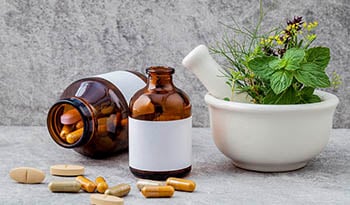The Top 10 Supplements of 2019 and Beyond
DISCLAIMER:This blog does not intend to provide diagnosis...
- In this article:
- Omega-3 Fish Oil
- Whey Protein
- Probiotics
- Collagen
- Calcium With Magnesium
- Vitamin C
- Multivitamins
- Biotin (Vitamin B7)
- Krill Oil
- Co-Enzyme Q10

There are some exciting health trends being predicted for this coming new year, 2020. Using the AI (artificial intelligence) of a smart phone or watch, people have access to biometric data, allowing one to make smarter diet, lifestyle and fitness decisions.
Further, the evidence shows many of us are relying more on breathing and meditation apps- which have become increasingly popular and helpful in our perpetual quest for peace and relaxation. Likewise, search engine inquiries into sound bath healing, virtual wellness and wellness retreats have grown exponentially. Many are now realizing that one must approach health holistically- to create ultimate wellness. The top supplements of 2019 listed below also appeared to play an important role in complete health and wellness this year.
Omega-3 Fish Oil
Omega-3 Fish Oil is a fatty acid that consists primarily of eicosapentaenoic acid (EPA) and docosahexaenoic acid (DHA). These important nutrients are also found in a variety of food sources, which include fish (mackerel, cod, and salmon are among the richest), walnuts, chia seeds, flax seeds and hemp seeds.
Omega-3 fatty acids appear to be beneficial for all aspects of health and every cell of the human body requires them. A 2014 study in Nutrition Journal showed that the majority of people around the world do not consume enough fish oil nor essential fatty acids in their diet. Low levels of omega-3 fatty acid intake is associated with lower levels of BDNF, a brain protein required for new memory formation.
A 2013 study in the British Journal of Nutrition showed that fish oil could help encourage the growth of healthy gut bacteria while also reducing intestinal inflammation. A 2015 study using rats also confirmed omega-3 fatty acids beneficial in improving overall gut health.
A 2017 study in Nutrition showed that a diet high in PUFAs (walnuts, sunflower seeds, flaxseed, fish) helped one feel fuller compared to a “normal” diet. Those who consumed more PUFAs (Polyunsaturated Fatty Acids) had lower ghrelin (a hunger hormone) and increased fasting peptide, a gut hormone that reduces short term food intake)
Many doctors also believe the Omega-3 fish oil benefits the heart and overall vascular health. Suggested dose: Omega-3 fish oil 1,000 to 4,000 mg daily
Whey Protein
Proteins are essential for the development and functioning of all life. They are composed of amino acids, which are considered the building blocks of all protein molecules. Worldwide, protein deficiency is a growing health concern in developing countries and accounts for 30-40% of hospital admissions in developing countries. This is due primarily to inadequate dietary intake of protein. Foods rich in protein include meats, poultry, seafood, eggs, cheese, seeds (pumpkin, sesame and sunflower) and beans (kidney, pinto, black and soy).
Whey protein is a common supplement used by those who exercise routinely and by those who are competitive athletes. Protein can be satiating, meaning it can help reduce appetite and therefore beneficial for those trying to lose weight.
The protein in cow’s milk is 20 % whey, 80% casein. Interestingly, human milk is 60% whey, 40 % casein. Whey is the liquid portion byproduct of the cheesemaking process.
Whey protein is rich in branched-chain amino acids and essential amino acids. It also contains functional peptides, antioxidants and immunoglobulins, which help strengthen the immune system.
Whey is frequently used as a meal replacement by individuals who are trying to maintain or lose weight. Whey is also a popular source of protein for those trying to build muscle and also helps reduce appetite.
Health benefits of whey protein include:
- Encourages muscle growth
- Lowers blood pressure
- Lowers blood sugar
- Lowers cholesterol
- Helps the liver remove toxins
A 2010 study in the British Journal of Nutrition evaluated whey’s effect on cholesterol, sugar and insulin levels in obese test subjects. The study lasted 12 weeks. In the end, there was no change in weight but those who consumed the whey protein saw their serum triglycerides, total cholesterol and LDL (bad) cholesterol reduced. In addition, their fasting insulin levels were reduced, which is a good thing. 2017 meta-analysis study showed whey protein could reduce both long term and short-term appetite
2018 study Journal of American College of Nutrition. “Whey protein supplementation seems to improve body weight, total fat mass, and some CVD risk factors in overweight and obese patients. Further studies regarding optimal dosage and duration of whey protein supplementation would be helpful to assess potential favorable effects in individuals who are overweight or obese.
Whey protein is a great addition to a fruit and vegetable smoothie. Alternatively, it can be mixed with water or milk or even a bowl of oatmeal. Suggested dose: As directed on the label.
Probiotics
Humans have somewhere between 50-100 trillion gut bacteria, which comes from 1,000 different species collectively known as the microbiome. Over the last decade, doctors have learned that the health of our gut bacteria determines our overall health. Probiotics supplements contain microorganisms, bacteria that are similar to those found in the intestines of a healthy individual.
Healthy food encourages the growth of beneficial bacteria while excess consumption of sugary and processed foods encourages the growth of harmful bacteria leading to a condition called leaky gut.
In addition, there is good evidence that probiotic treatment is beneficial for the following ailments.
- Depression and anxiety
- Migraine headaches
- Fibromyalgia
- Antibiotic induced diarrhea
- Clostridium difficile diarrhea
- Irritable bowel syndrome (IBS)
- Ulcerative colitis
A 2015 study by Cochrane Review concluded that probiotics were helpful in preventing antibiotic caused diarrhea in children. Repair of this intestinal imbalance, or leaky gut, is crucial to help restore overall health. A 2019 study evaluated 44 patients who had a heart attack and who underwent a cardiac procedure. Half the patients were given a probiotic (Lactobacillus rhamnosus) while the other half a placebo pill. Those given the probiotic not only had less depression but also saw a reduction in cardiac-CRP, a blood test that measures the amount of inflammation in the blood vessels.
Probiotics are considered safe for infants, children, adults, and senior citizens. Suggested dose: 5 billion units or more.
Collagen
Muscles, bones, skin and tendons are composed primarily of collagen, the most abundant type of protein in the human body. To be specific, collagen consists of 30-35 percent of all the protein in the human body. Collagen protein is also known as connective tissue and is responsible for stabilizing our skin and maintaining joint movement and flexibility. In addition, collagen provides our skin with elasticity.
As we age, our skin loses its elasticity and becomes more wrinkled. The are many reasons for this- reduced ability to manufacture collagen is partly responsible while life’s stressors and oxidative damage also play a significant role.
Collagen supplements contain a wide variety of amino acids necessary for hair growth as well as skin, tendons and bone health. Collagen is a good option for those who may want to ensure they are getting adequate amino acids but want to consume them using gluten-free and dairy-free supplements. Weight lifters frequently use collagen supplementation to ensure they maximize muscle growth. Sometimes they chose whey protein powder.
Collagen may be helpful with the following:
- Arthritis
- Gut health
- Osteoporosis
- Tendon health
- Cellulite reduction
- Wrinkles and Anti-aging
- Nail & hair growth
A 2014 study concluded that collagen supplementation enhanced skin hydration and elasticity.
Another 2014 study had test subjects take a combination of collagen (3 gm/day) and astaxanthin (2mg/day) vs a placebo. Those who took the supplements had improved skin elasticity and barrier protection.
There are various formulations of oral collagen supplements available online. Some are of bovine (cow) origin while others are marine (fish) in origin. I recommend at least 3,000 to 5,000 mg daily be taken. Taking an additional 1,000 to 2,000 mg of vitamin C should also be considered to help optimize collagen strength and production.
Calcium With Magnesium
Optimizing bone health and muscle mass is crucial for maintaining overall health. Osteopenia and osteoporosis are conditions diagnosed by a doctor when bone density is thinner than expected for a person’s age. For many, bones thin with aging. However, there are things that can be done to help ensure bones remain strong and reduce the chance of breakage. This is frequently done with diet, exercise and supplements like calcium and magnesium in both pill and liquid forms. Learn more about Natural Approaches to Building Strong Bones.
Calcium – Ensuring your diet is high in calcium-rich fruits and vegetables is important for keeping bones strong. It also helps with vascular and muscle function as well as nerve transmission. Suggested dose: As directed on the label.
Magnesium – An adequate intake of magnesium-rich foods, which include green vegetables, is crucial. Magnesium works together with calcium to make bones strong. It is also great for preventing leg cramps, migraine headaches and, in some cases, heart palpitations. Suggested dose: As directed on the label.
Vitamin C
Vitamin C, also known as ascorbic acid or ascorbate, has been one of the most researched vitamins over the last 50 years—the scientific literature shows that over 50,000 studies have been conducted on vitamin C since the 1960s. The findings show that it helps promote a strong immune system as well as cardiovascular, brain, and skin health among many other benefits.
Symptoms of vitamin C deficiency include easy bruising, bleeding gums, fatigue, depression, joint, and bone pain or muscle aches and swelling
Health Benefits of Vitamin C
- Helps treat anemia by assisting iron absorption
- Supports collagen and skin
- Optimizes heart health
- Supports the immune system
- Helps prevents upper respiratory infections/cold
- Treats sepsis (blood infection)
Vitamin C is a water-soluble vitamin. To help increase absorption, scientists have developed liposomal vitamin C, a fat-soluble covering that helps the ascorbic acid more easily pass through the digestive tract. Suggested dosage: Vitamin C capsules/tablets – 250 mg to 2,000 mg per day. Available also as powder and gummies.
Multivitamins
A multivitamin should never be expected to replace a healthy well-rounded diet. The World Health Organization estimates that 2 billion people worldwide have inadequate vitamins and minerals.
Studies show that many Americans also have inadequate intake of several essential vitamins and minerals. The recent 2015–2020 Dietary Guidelines for Americans identified the fat-soluble vitamins A, D, E as being under-consumed while the water-soluble vitamin C and choline were under-consumed.
Further, the intake of calcium, magnesium and iron (in women of childbearing age) and potassium are also frequently deficient. This alone is an adequate reason to take a multivitamin.
A 2008 study in Thyroid demonstrated that eleven percent of the population had a moderate to severe iodine deficiency. Another ten percent are mildly deficient. For most, a multivitamin, which contains 150 mcg of iodine, would have prevented this deficiency which affects 1 in 5 people.
While a well-balanced diet is essential to optimal health, our daily stressors can put additional metabolic demands on our body that may not always be fulfilled by diet alone. Chronic disease affects our nutrient requirements while many popular prescription drugs can also deplete the body of important vitamins and minerals.
On June 19, 2002, a study in the Journal of the American Medical Association recommends that “all adults take one multivitamin daily....” A quality multivitamin provides additional assurance that the body is getting what it needs.
Suggested dose: As directed on the label
Biotin (Vitamin B7)
Biotin, or vitamin B7, is sometimes referred to as “vitamin H”, a reference to haar und haut, German for “hair and skin”. Biotin is important for enzymes involved in the metabolism of proteins, carbohydrates, and fats.
Biotin is a B vitamin, also known as vitamin B7. This vitamin, found in foods such as eggs, meat, nuts, and seeds, helps the body make energy out of fats, carbohydrates and proteins. Frequently recommended for all types of hair loss, studies have shown benefits of biotin when taken with other nutrients (such zinc, vitamin C, E, and magnesium) for telogen effluvium specifically, a reversible condition in which one’s hair falls out after a stressful experience.
Biotin is commonly taken by those seeking a natural approach to reversing hair loss.
Risks for vitamin B7 deficiency include heavy alcohol use, digestive disorders or taking certain medications (anti-seizure medications, antibiotics).
Symptoms of vitamin B7 deficiency
- Hair loss
- Thin or brittle nails
- Depression
Food sources of vitamin B7
- Chicken liver/beef liver
- Salmon
- Eggs
- Yeast
- Avocado
- Sunflower and chia seeds
A 2016 study in the International Journal of Trichology showed biotin deficiency in 38 percent of women who had hair loss. Suggested dose: As directed on the label.
Krill Oil
Krill is a small, red, lobster-like creature found in the Atlantic Ocean. Krill oil is an essential fatty acid that is extracted from the crustacean. It contains the same omega-3 fatty acids as omega-3 fish oil and, for that reason, is chosen by many as an alternative.
Krill oil is an omega-3 fatty acid with numerous health benefits. It's also a natural anti-inflammatory medication that can help reduce the risk for heart disease and atherosclerosis, in addition to minimizing the pain associated with both rheumatoid and osteoarthritis. A 2016 study showed krill oil could suppress colon cancer cells from growing.
Krill oil can:
- Reduces CRP (C-reactive protein)
- Optimize Cholesterol profile
- Promote gut health
- Improve Memory
- Reduce Inflammation in Rheumatoid Arthritis and Osteoarthritis
Suggested Dosage: The usual dose of krill oil 500 mg to 2,000 mg daily. Some manufacturers combine krill oil with astaxanthin, which provides extra anti-inflammatory and antioxidant benefits.
Co-Enzyme Q10
Coenzyme Q10 (CoQ10), also known as ubiquinone, is a naturally occurring antioxidant required for life. Coenzyme Q10 is required for cells to generate energy. This is done, primarily, in a part of the cell doctors call mitochondria, the cellular power plant that generates energy in the body. If the power plant is not generating sufficient energy, fatigue results.
Since the heart is the most active of all organs, it produces and requires the most CoQ10 in order to meet its metabolic demands. However, in those with cardiac disease, higher levels of CoQ10 are required to help optimize function.
When a supplement is taken, the body will convert 90 percent of CoQ10 into ubiquinol, the active form of the supplement. Coenzyme Q10 is taken for the following conditions:
- Migraine headaches
- High blood pressure
- Congestive heart failure
- Chronic fatigue syndrome/Myalgic encephalomyelitis
- Fibromyalgia
- Prevents progression of macular degeneration
- Tinnitus (ringing in the ears)
- Facial wrinkles (topical CoQ10 )
Suggested dose: 100 to 300 mg per day oral or topically as directed.
References:
- Papanikolaou Y, Brooks J, Reider C, Fulgoni VL. U.S. adults are not meeting recommended levels for fish and omega-3 fatty acid intake: results of an analysis using observational data from NHANES 2003–2008. Nutrition Journal. 2014;13:31.
- Omega-3 fatty acid deficiency during brain maturation reduces neuronal and behavioral plasticity in adulthood. Bhatia HS, Agrawal R, Sharma S, Huo YX, Ying Z, Gomez-Pinilla F PLoS One. 2011; 6(12):e28451.
- Diets rich in n-6 PUFA induce intestinal microbial dysbiosis in aged mice. Ghosh S, Molcan E, DeCoffe D, Dai C, Gibson DL Br J Nutr. 2013 Aug 28; 110(3):515-23.
- N-3 Polyunsaturated Fatty Acids (PUFAs) Reverse the Impact of Early-Life Stress on the Gut Microbiota. Pusceddu MM, El Aidy S, Crispie F, O'Sullivan O, Cotter P, Stanton C, Kelly P, Cryan JF, Dinan TG PLoS One. 2015;
- Nutrition. 2017 Sep;41:14-23
- Jay R. Hoffman & Michael J. Falvo (2004). "Protein - Which is best?". Journal of Sports Science and Medicine (3): 118–130.
- Luhovyy BL, Akhavan T, Anderson GH (2007). "Whey proteins in the regulation of food intake and satiety". Journal of the American College of Nutrition. 26 (6): 704S–712S.
- J Am Coll Nutr. 2017 Oct 31:1-11. Benefits of Whey Protein
- Br J Nutr. 2010 Sep;104(5):716-23
- Clin Nutr ESPEN. 2017 Aug;20:34-40
- Cochrane Database Syst Rev. 2015 Dec 22;(12):CD004827.
- Psychosom Med. 2019 Oct 4.
- J Med Food. 2014 Jul;17(7):810-6. doi: 10.1089/jmf.2013.3060. Epub 2014 Jun 23.
- Allen L., de Benoist B., Dary O., Hurrell R. Guidelines on Food Fortification with Micronutrients. World Health Organization; Geneva, Switzerland: 2006
- U.S. Department of Health and Human Services. U.S. Department of Agriculture . 2015–2020 Dietary Guidelines for Americans. 8th ed. USDA; Washington, DC, USA: 2015. [(accessed on 17 January 2017)]. Azailable online: http://health.gov/dietaryguidelines/2015/guidelines/
- Fletcher RH, Fairfield KM. Vitamins for Chronic Disease Prevention in Adults Clinical Applications. JAMA.2002;287(23):3127–3129.
- Clin Cosmet Investig Dermatol. 2018 Sep 10;11:431-436. doi: 10.2147/CCID.S173082. eCollection 2018.
- Serum Biotin Levels in Women Complaining of Hair Loss. International Journal of Trichology. 2016;8(2):73-7.
- Mol Nutr Food Res. 2017 Aug 15. (Krill oil can help prevent atherosclerosis)
- Jayathilake AG, Senior PV, Su XQ. Krill oil extract suppresses cell growth and induces apoptosis of human colorectal cancer cells. BMC Complementary and Alternative Medicine. 2016;16(1):328.
- Macular Degeneration http://www.eurekaselect.com/154613/article
- Otolaryngol Head Neck Surg. 2007 Jan;136(1):72-7.
- Biofactors. 2017 Jan 2;43(1):132-140. doi: 10.1002/biof.1316. Epub 2016 Aug 22.

 By Dr. Eric Madrid, M.D.
By Dr. Eric Madrid, M.D.


